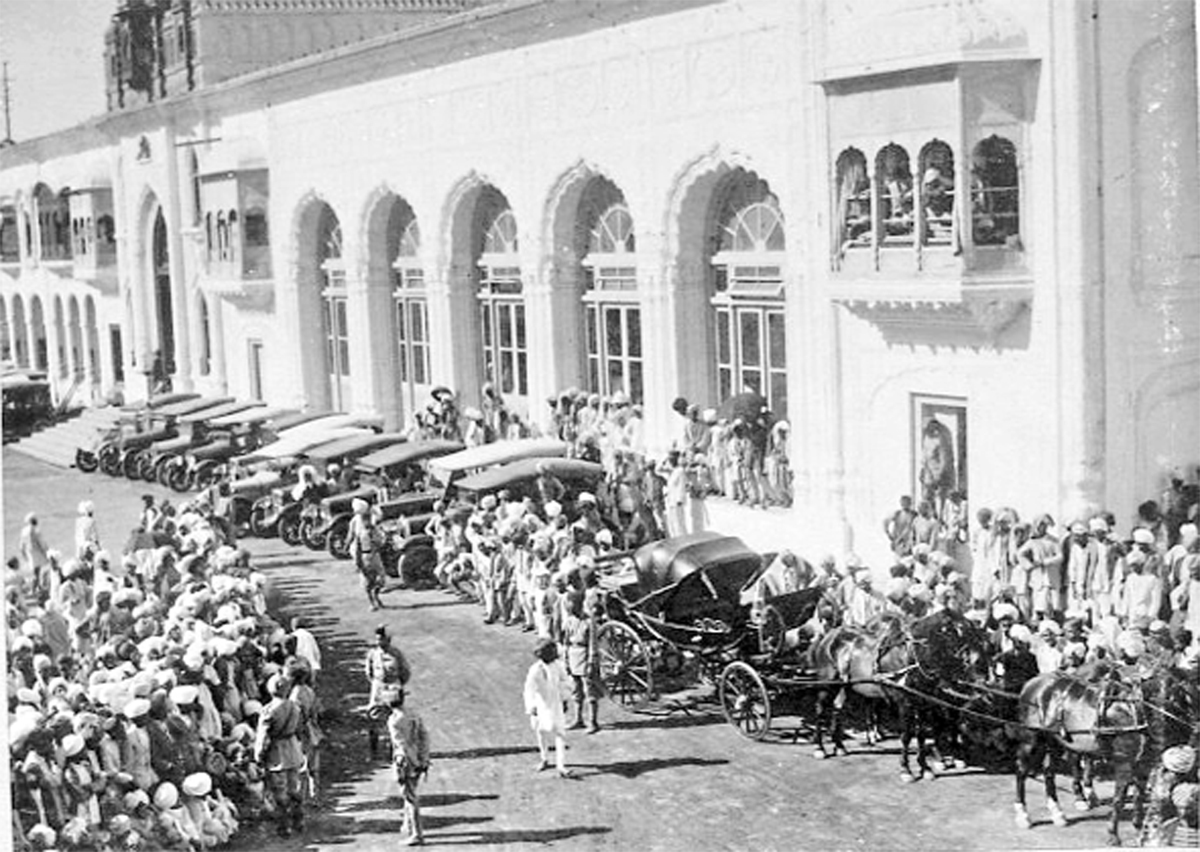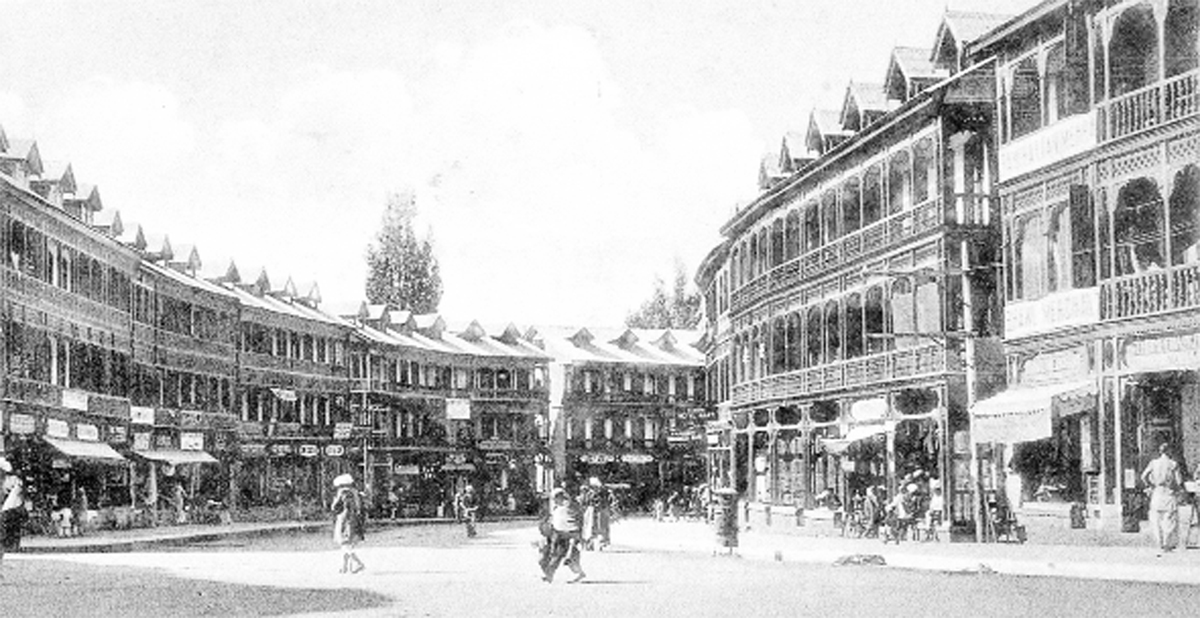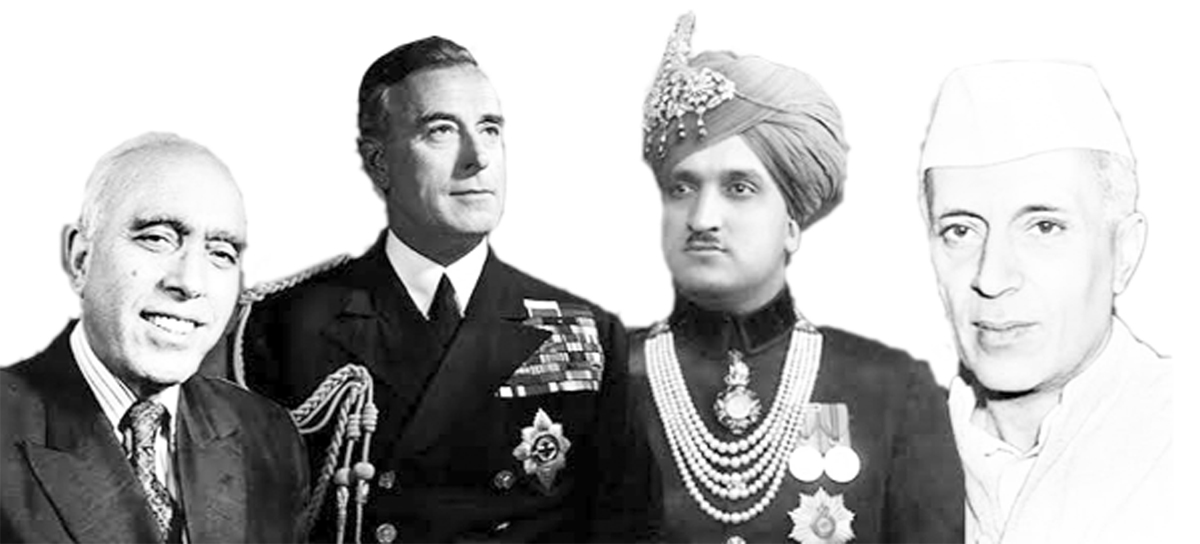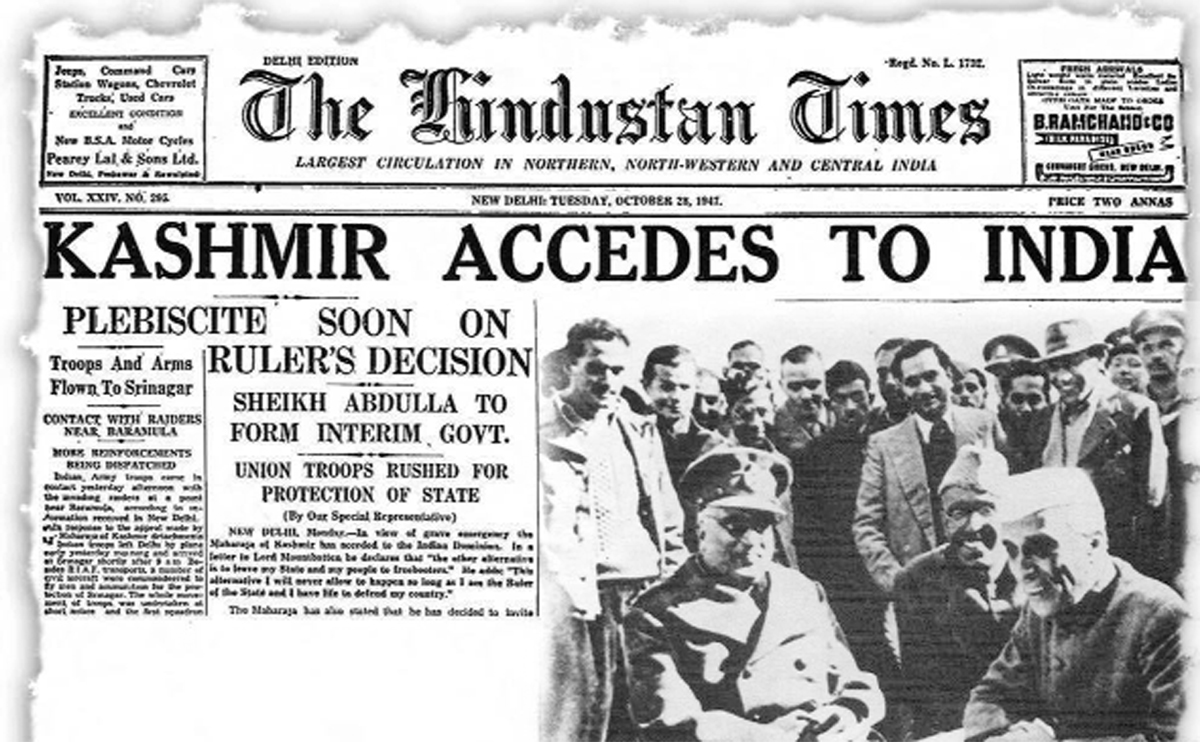Journey from Accession to Integration
A look back at Accession Days
Daily Excelsior takes esteemed readers back to the days when Jammu and Kashmir -a princely State then acceded to India through Instrument of Accession (IOA) on Oct 26, 1947 by presenting different perspectives on this historic development in this issue of the Sunday Magazine. -Editor
Rajan Gandhi
Since August 5, 2019 all anomalies, discrimination, inequality, anti India activities, efforts to bleed India, sufferings of local population all have been set to rest once for all with the Central Government’s decision to abrogate Article 370 and 35A, but journey from accession to India to full integration with India has not been easy at all for Jammu and Kashmir. J&K’s  delayed accession created by circumstances and forced by compulsions crafted a web in which whole nation got entangled ever since independence. It all started when our state witnessed successive famines along with epidemics like cholera/plague from 1877 to 1910 AD, which decimated quite a population. Harsh climate with difficult road connectivity created resentment among people. British authorities took advantage of this and appointed Sir Olivier St. John as the first Resident as they divested powers of Maharaja Pratap Singh after allegations of treasonable correspondence with Russian authorities. All these actions along with illiteracy fuelled a permanent discontent between Muslim population and Dogra rulers. Meanwhile Sheikh Abdullah after getting influenced by Aligarh Muslim University’s Khilafat Movement and Indian National Movement led by Gandhiji, a “Fateh Kadal reading room party” was crafted and Sheikh emerged as leader supported by Mirwaiz Mohammad Yusuf Shah and Mirwaiz Hamdani. Trial of Abdul Qadeer resulted in 1931 communal riots after which All Jammu and Kashmir Muslim Conference was formed in 1932. Mirwaiz Mohammad Yusuf Shah raised the banner of revolt and founded a new organization Azad Muslim Conference. Disobedience Movement in March 1933 was overshadowed by the sectarian clashes between the supporters of the two Mirwaiz’s of Kashmir. In 1934, first 75-seat assembly of state was formed and MC won majority of Muslim seats sidelining Mirwaiz Yusuf Shah’s party. On April 26, 1939 the General Council approved the resolution and recommended amendment in the name and constitution of MC which was renamed as National Conference (NC) to give it a secular outlook.
delayed accession created by circumstances and forced by compulsions crafted a web in which whole nation got entangled ever since independence. It all started when our state witnessed successive famines along with epidemics like cholera/plague from 1877 to 1910 AD, which decimated quite a population. Harsh climate with difficult road connectivity created resentment among people. British authorities took advantage of this and appointed Sir Olivier St. John as the first Resident as they divested powers of Maharaja Pratap Singh after allegations of treasonable correspondence with Russian authorities. All these actions along with illiteracy fuelled a permanent discontent between Muslim population and Dogra rulers. Meanwhile Sheikh Abdullah after getting influenced by Aligarh Muslim University’s Khilafat Movement and Indian National Movement led by Gandhiji, a “Fateh Kadal reading room party” was crafted and Sheikh emerged as leader supported by Mirwaiz Mohammad Yusuf Shah and Mirwaiz Hamdani. Trial of Abdul Qadeer resulted in 1931 communal riots after which All Jammu and Kashmir Muslim Conference was formed in 1932. Mirwaiz Mohammad Yusuf Shah raised the banner of revolt and founded a new organization Azad Muslim Conference. Disobedience Movement in March 1933 was overshadowed by the sectarian clashes between the supporters of the two Mirwaiz’s of Kashmir. In 1934, first 75-seat assembly of state was formed and MC won majority of Muslim seats sidelining Mirwaiz Yusuf Shah’s party. On April 26, 1939 the General Council approved the resolution and recommended amendment in the name and constitution of MC which was renamed as National Conference (NC) to give it a secular outlook.
 As the World War II broke, NC moved further closer to Indian National Congress by formally endorsing INC’s stand on war. Ghulam Abbas and Alla Rakh Sagar resigned on this from NC and revived MC in 1941 with Mirwaiz Yusuf Shah as their representative in Srinagar. This MC received its ideological support from the Muslim League which by then had passed the Pakistan Resolution. In 1940 Nehru visited Kashmir along with Khan Abdul Gaffar Khan declaring NC as sole national organization of the state and also nominated Sheikh Abdullah as Vice President of the All-India States People’s Conference, a Congress-allied group of movements in Princely States but this presented incontestable proof to Kashmiri Muslims that Sheikh Abdullah was a puppet of the Congress. To counter this NC organized a statewide protest day and in June 1941 NC instructed its members to resign from the Praja Sabha. With Congress leaders in jail after launching Quit India movement, Muslim League with its local ally MC had a free run as a result Sheikh Abdullah patched up with Dogra Darbar, got his members nominated back to assembly and to the boards responsible for issuing rice ration tickets and permits for fuel as well as to the Parliamentary Committee set up in 1943 to make proposals for constitutional reforms. The NC members were subsequently alleged for corruption and discrimination. Sheikh Abdullah advised Mirza Afzal Beg and G.M Sadiq, two members of the Royal Commission, appointed by the Maharaja for the evolution of an organic scheme for the administration of the state, to resign. NC submitted its own plan ‘Naya Kashmir’, drafted by communist P.B.L Bedi. Meanwhile Jinnah also visited Kashmir in 1944 and instructed NC to merge with MC. Abdullah refused and with this rift with Jinnah widened. All this propelled the Dogra regime into announcing plans for diarchy on October 2, 1945. Accordingly NC got appointed Mirza Afzal Beg as Minister of Public Works but growing scarcities in both urban and rural areas caused by the World War II, people’s discontent reached to the boiling point as Beg’s Rs 1600/= per month salary and official car were so glaring. NC soon realized it and rift with Maharaja further widened as on 18th March 1946 NC representative resigned from the Kashmir ministry. The state hit back by appointing the leader of the NC legislators Mian Ahmad Yar as minister thus giving a big blow to the NC’s scheme of things and its mass following.
As the World War II broke, NC moved further closer to Indian National Congress by formally endorsing INC’s stand on war. Ghulam Abbas and Alla Rakh Sagar resigned on this from NC and revived MC in 1941 with Mirwaiz Yusuf Shah as their representative in Srinagar. This MC received its ideological support from the Muslim League which by then had passed the Pakistan Resolution. In 1940 Nehru visited Kashmir along with Khan Abdul Gaffar Khan declaring NC as sole national organization of the state and also nominated Sheikh Abdullah as Vice President of the All-India States People’s Conference, a Congress-allied group of movements in Princely States but this presented incontestable proof to Kashmiri Muslims that Sheikh Abdullah was a puppet of the Congress. To counter this NC organized a statewide protest day and in June 1941 NC instructed its members to resign from the Praja Sabha. With Congress leaders in jail after launching Quit India movement, Muslim League with its local ally MC had a free run as a result Sheikh Abdullah patched up with Dogra Darbar, got his members nominated back to assembly and to the boards responsible for issuing rice ration tickets and permits for fuel as well as to the Parliamentary Committee set up in 1943 to make proposals for constitutional reforms. The NC members were subsequently alleged for corruption and discrimination. Sheikh Abdullah advised Mirza Afzal Beg and G.M Sadiq, two members of the Royal Commission, appointed by the Maharaja for the evolution of an organic scheme for the administration of the state, to resign. NC submitted its own plan ‘Naya Kashmir’, drafted by communist P.B.L Bedi. Meanwhile Jinnah also visited Kashmir in 1944 and instructed NC to merge with MC. Abdullah refused and with this rift with Jinnah widened. All this propelled the Dogra regime into announcing plans for diarchy on October 2, 1945. Accordingly NC got appointed Mirza Afzal Beg as Minister of Public Works but growing scarcities in both urban and rural areas caused by the World War II, people’s discontent reached to the boiling point as Beg’s Rs 1600/= per month salary and official car were so glaring. NC soon realized it and rift with Maharaja further widened as on 18th March 1946 NC representative resigned from the Kashmir ministry. The state hit back by appointing the leader of the NC legislators Mian Ahmad Yar as minister thus giving a big blow to the NC’s scheme of things and its mass following.
 Meanwhile British Cabinet Mission pronounced the return of full powers to the rulers of the Princely States which meant Maharaja would decide which dominion J & K would join which increased the worries of Sheikh Abdullah as this would have meant no role for him post partition. Agitated Sheikh denounced the Treaty of Amritsar and asked Maharaja Hari Singh to ‘Quit Kashmir’ and transfer sovereignty to the people. A crackdown resulted and Sheikh Abdullah was arrested along with other leaders of NC in May. His lieutenants, Bakshi and Sadiq escaped to Delhi and Nehru in June 1946 forcibly tried to enter J and K without permit, was subsequently arrested and sent back creating further rift. On 10th September 1946 after sedition trial, Sheikh Abdullah was convicted of treason, given three and a half years imprisonment despite Nehru’s best efforts to save his friend.
Meanwhile British Cabinet Mission pronounced the return of full powers to the rulers of the Princely States which meant Maharaja would decide which dominion J & K would join which increased the worries of Sheikh Abdullah as this would have meant no role for him post partition. Agitated Sheikh denounced the Treaty of Amritsar and asked Maharaja Hari Singh to ‘Quit Kashmir’ and transfer sovereignty to the people. A crackdown resulted and Sheikh Abdullah was arrested along with other leaders of NC in May. His lieutenants, Bakshi and Sadiq escaped to Delhi and Nehru in June 1946 forcibly tried to enter J and K without permit, was subsequently arrested and sent back creating further rift. On 10th September 1946 after sedition trial, Sheikh Abdullah was convicted of treason, given three and a half years imprisonment despite Nehru’s best efforts to save his friend.
On the other hand on 16th August 1946- MC celebrated ‘Azad Kashmir Day’ with a state wide hartal call which resulted in crack down on MC also and Choudhary Abbas joined his one time friend turned foe Sheikh Abdulaah in jail. Thus, far from ending the Dogra rule in the state, both NC and MC were left leaderless and in disarray during the most important period of Kashmir’s modern history. By March 1947 communal fires were set ablaze in Multan, Rawalpindi, Amritsar, Lahore, Campbellpur, Murree, Taxila and Attock forcing sealing of Kashmir-Punjab border to ensure communal harmony. Final drama of J&K unveiled as the leaders of the two dominions started the process of integrating the States to their side. At this point Maharaja had three options; accept proposal of MC and go with Pakistan but joining Pakistan would mean that the substantial number of Hindus in J&K might have to flee and despite personal assurances to Maharaja Hari Singh, a Hindu prince’s future would be uncertain in an avowedly Islamic country. Other option, an accession to Indian which meant his own future at stake as Nehru, the Maharaja’s arch-critic, was to be Prime Minister who would have favored Sheikh over him. The third option for Maharaja was pulling off independence with the support of Abdullah, but this was not possible in view of the long-standing enmity between them and resultant mistrust. Kashmir’s accession to the Jinnah’s Pakistan was also equally important as four of the five rivers in West Pakistan (Indus, Jehlem, Chenab, and Ravi) originated from J & K.
Meanwhile, the most important thing happened, the Boundary Commission appointed to draw a line on the map through Punjab divided Gurdaspur district adjoining Jammu and awarded the three eastern Tehsils to India, thus providing road access to Jammu which would not have been possible otherwise. After this, Nehru took peculiar and adamant stand that Kashmir should accede to India but only after Sheikh Abdullah was released. Mountbatten, who was still Viceroy of British Government, visited Kashmir from 18th to 23rd June, 1947 but he failed in persuading Maharaja. Maharaja still remained indecisive and finally three days before the transfer of power, he announced his intention of signing a standstill agreement with both Pakistan and India that would assure that arrangements for trade, travel, communications and other services would continue as with British India, Pakistan accepted it but India rejected it.
Rest of India became independent and things rolled out very fast as between August and October, a major local religion based revolt against the Maharaja’s authority developed among Muslims in the North-Western Poonch area of Jammu. Pakistan tried to put pressure on Maharaja’s administration to accede to Pakistan with supplies of commodities running short in Kashmir as Pakistan blockaded Rawalpandi road against standstill agreement with Pakistan. By 11th to 13th August 1947 partition violence erupted in Sialkot driving the surviving Hindus and Sikhs to Jammu and on 18th August 1947 in one of the worst train massacres of the partition, Lohars and Muslims of Nizamabad killed all the Hindu and Sikh passengers of Wazirabad-Jammu train. With efforts of Sardar Patel, Sheikh Abdullah was released on September 29th after he assured Maharaja “the fullest and loyal support.” But Sheikh Abdullah lost no time in reasserting his political creed and in his first speech at Hazooribagh on 3 October 1947, he promptly began a campaign for popular government, a must before deciding which dominion to join. With Sheikh Abdullah still busy in his politics to create a space for himself, several thousand bellicose Pathan tribesmen from the North West Frontier Province (NWFP), supported by the Chief Minister of that province and Pakistani army, invaded the Kashmir valley. The lightening speed got State Administration as well as NC panicked as its slogan “freedom before accession” was rendered irrelevant in view of tribal invasion from Pakistan. Thus, Sheikh Abdullah and his party were forced to throw in their lot with India. Maharaja signed ‘The Instruments of Accession of Jammu and Kashmir’ on 26th October 1947 which was accepted by the Government of India on 27th October. Sheikh Abdullah provided “fullest support” to the accession. Despite opposition from Patel and Mehar Chand but ill advised by Mountbatten and an assurance from Sheikh Abdullah, Nehru declared his government’s ‘pledge’ to ‘hold a referendum under UN. Game was set with both Nehru and India in trap and not surprisingly on January 31st, 1948 Hari Singh threatened to “withdraw the accession made to the Indian Union.” Sheikh sensed that and made to make amends but emphasizing on the provisional nature of the accession he tried to bargain. Both he and Nehru were opposed to Kashmir’s accession to Pakistan, but Nehru was opposed to its autonomy also. Nehru fought on both fronts and created a mess.
This politics leashed by Sheikh Abdullah along with Nehru and bitterness of Maharaja Hari Singh with both of them created an ideal mess which Pakistan utilized to create a tangle which we are still not able to neutralize. Sheikh’s initial stand of public’s popular rule turned into autonomy demand under changed circumstances of 1947 and the worst part is that nationalist voices of people of Jammu remained irrelevant in the whole process. It all started with the signing of Instrument of Accession and with it Jammu’s independent status ended on October 26th-27th, 1947. This Jammu Dogra ruled state, once the largest princely state with an area of 84,471 sq km – one of the four states that were given the highest “21-gun salute” status in recognition of its prestige during the British Empire. Gulab Singh, Dhruv Dev’s direct descendant, was 16 years old when Jammu was annexed to the Sikh Empire. Gulab Singh and his two brothers, Dhyan Singh and Suchet Singh, went on to enroll with the Sikh forces and Gulab Singh soon distinguished himself in battle as such was awarded a Jagir near Jammu and he was also allowed to keep an independent army. After the conquest of Kishtwar (1821) and the subjugation of Rajouri, he was made a hereditary Raja of Jammu in 1822, with an annual allowance of three lakh rupees. Everything worked fine under Dogra rule till the arrival of Sheikh Abdullah on political scene as he conspired with Jawahar Lal Nehru to dethrone Maharaja Hari Singh and thus one of the three preconditions of the Union of India for signing the accession treaty with the Dogra ruler was the installation of the virulently anti-Dogra-rule leader from the Kashmir Valley, Sheikh Abdullah, as the “Prime Minister” and with it totally unjustified assembly seats allocation. Later on, the chaos, continued mishandling and the unsettled borders with our overenthusiastic hawk eyed neighbour Pakistan, ensured that the wounds suppurate to morph it into a full-fledged armed insurgency in the Kashmir Valley, driving the national attention and imagination, essentially towards the Kashmir Valley only always. That the Jammu division though at present having more population as well as land area of 26 % as compared to 16% of land of Kashmir was further pushed to wall ensuring that the practical representation amongst the state lawmakers in a participative form of democracy further veered the focus disproportionately towards the Kashmir valley, as opposed to a more equitably proportionate attention towards the perpetually neglected Jammu region.
Practically Kashmir Valley has been consistently accorded the lion’s share of all investments, focus and priorities, with Jammu penalized for its mute nationalistic silence. Even the legitimate socio-economic grievances of the Jammu region have been turned down time and again so much so that narrative has boiled down to a predominantly religious perception, which detracts, diminishes and short-sells from the irrefutable Jammu’s case of discrimination. The game of musical chair of CM continued between Congress and NC unabated to the extent that NC merged with Congress for power- creation of Plebiscite Front, then again parting ways with Congress after release of Sheikh Abdullah, murder and mockery of democracy in 80’s after the death of Sheikh Abdullah, first by removing Dr. Farooq Abdullah and then by installing Farooq again via rigged elections resulting into onset of terrorism. After some semblance in late 90’s for a decade once again era of hartals, violent protests started unabated be it 2008 Shri Amarnath agitation, 2009 Shopian fake rape and murder agitation, 2010 fake encounter allegation, 2014 floods, 2016 gunning down of terrorist Burhan Wani, 2018 agitation, in fact Kashmir valley never saw continuous peace and even minor law and order issues were snowballed into major controversies so much so that valley saw lockdown for months together with stone pelting becoming full time profession and mob lynching order of the day, Pulwama attack on CRPF convoy was the last nail in the coffins of separatism. Pro Pakistan slogans in the Legislative Assembly were also raised by NC MLA and practically NC,PDP, Hurriyat are all on one platform, follow Pro Pakistan agenda only. Jammu and Kashmir has received 10 per cent of all Central grants given to states over the 2000-2016 period, despite having only one per cent of the country’s population but majority of this money has been siphoned off instead of development works. Corruption, nepotism, hawala transactions, Jand K Bank scams all point to one thing only, political anarchy. Ultimately with Modi emerging strongly for second term and Amit Shah as HM, Jammu and Kashmir’s full integration India was announced as on 31st October J&K will be turned into UT, very much part of India with all laws of India now applicable to J &K, a sense of security and oneness has finally been done, dream of Shyama Prasad Mukherjee of ‘Ek Vidhaan Ek Nishaan Ek Pradhan’ fulfilled. A journey which started on 26 October 1947 is finally coming to a happy ending on 31st October as such as an occasion to celebrate 26th October should be marked as accession day, a day to celebrate our independence and integration with India.


